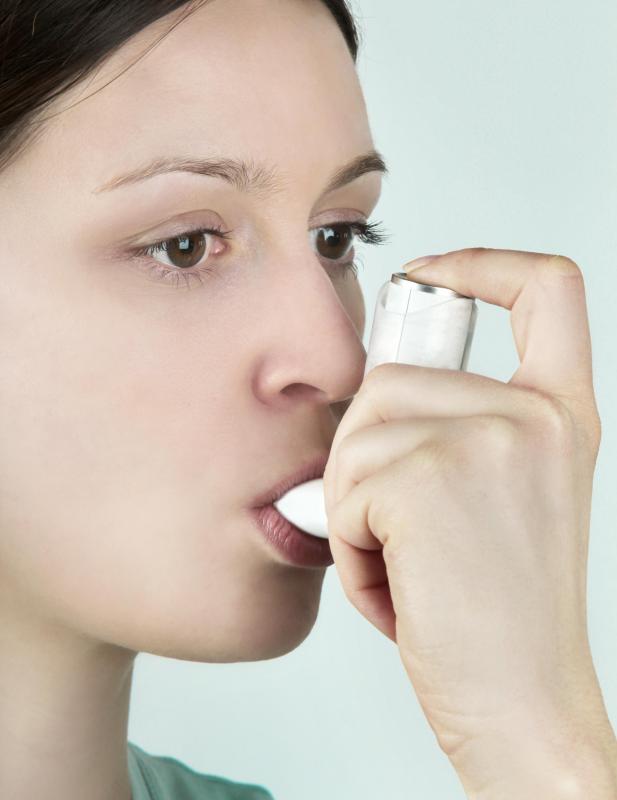At WiseGEEK, we're committed to delivering accurate, trustworthy information. Our expert-authored content is rigorously fact-checked and sourced from credible authorities. Discover how we uphold the highest standards in providing you with reliable knowledge.
What are the Most Common Inhaler Side Effects?
Most inhaler side effects are thought to be relatively mild. They include headache, upset stomach, a bad taste in the mouth, and an irritated throat or mouth. Some inhaler side effects may be more severe, though, especially for older women and those who have bad asthma. These severe risks may include a yeast infection in the mouth or throat and the acceleration of osteoporosis.
There are three main types of inhalers. The first is a nebulizer. This type of inhaler uses a tube or mask to deliver a dose of medicine. These inhalers are mainly used by children and the elderly.

The second type of inhaler is a metered-dose aerosol inhaler. When a person uses this inhaler, the medicine is forced into his mouth by pressurized gas. Another type of inhaler is a dry-powder inhaler. A person inhales the medicine himself, so a certain amount of force is needed to actually inhale the medicine all the way into the lungs. This can be difficult for small children, the elderly, and those who are having a severe asthma attack.

Each type inhaler may produce the same common inhaler side effects. A bad taste in the mouth and irritation in the throat is very common because the medicine passes through the mouth and throat on its way to the lungs. If a person rinses out his mouth after he uses an inhaler, the rinsing normally is sufficient to get rid of the bad taste. Thrush, which is a yeast infection of the mouth, may occur but usually only happens when a person is taking a higher dosage of inhaler medication.

Older women who take inhaled medicine for asthma might have more problems than other inhaler users. Acceleration of osteoporosis is often reported after a woman has gone through menopause. Medications can be given to treat osteoporosis if it identified as a problem.
The most common complaints out of all the inhaler side effects are headache and upset stomach. These are relatively minor inhaler side effects and can easily be treated. Many people who use inhalers do not experience any side effects at all.

A doctor should be able to tell his patient all of the risks associated with the asthma medication he prescribes. Together they can decide whether the benefits outweigh the risks. A doctor generally will prescribe the lowest dose needed to control a patient's asthma so inhaler side effects are less likely.
AS FEATURED ON:
AS FEATURED ON:















Discussion Comments
I've really not experienced any significant side effects from using my inhaler. Sometimes, if I'm forced to use it back to back because of an allergen, I get a bit of a sore throat. But I've noticed that brushing my teeth after using my inhaler and having a hot drink like herbal tea helps a lot. So I've not even been getting a sore throat all that often lately.
@SteamLouis-- I think almost everyone has experienced headaches at some point due to inhaler use. I think it also depends on the medication.
I understand what you mean by not being sure whether the inhaler is causing the side effect. I was experiencing dizziness and anxiety for a while after using my inhaler. I wasn't sure if it was just the inhaler or if I was experiencing panic and anxiety because of the thought that an attack is coming on.
Since asthma is a fairly serious chronic condition and affects our lives greatly, it can be difficult to know to what extent our psychological and physical symptoms are caused by it and by the medications used to treat it. But definitely tell your doctor about the headaches.
Ah, so inhalers do cause headaches!
I was recently diagnosed with asthma and I noticed that after using my inhaler, I always get a headache. Sometimes it's mild and sometimes it's quite bad. I suspected the inhaler but I wasn't sure. I though that it might be because of my wheezing and not getting enough oxygen. But this explains it. At least I know that it's the inhaler now.
If the headaches don't go away, I'm going to tell my doctor though. Maybe he can switch me to a different one. Does anyone else here get headaches right after using an inhaler?
Post your comments